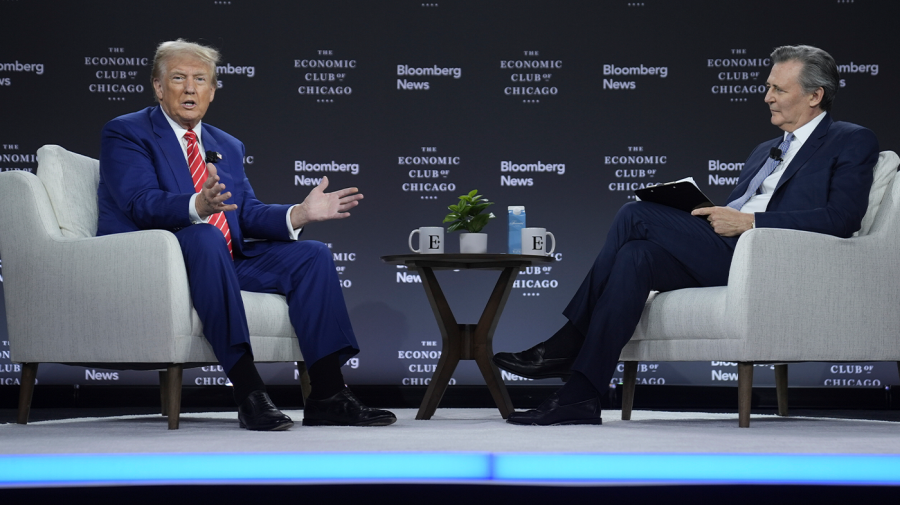Former President Donald Trump’s recent interview with Bloomberg News editor-in-chief John Micklethwait was marked by confrontations and revelations about his economic policies, foreign relations, and perspectives on his presidency. As Trump continues to position himself as a viable candidate for the 2024 elections, the interview served as a platform to emphasize his pro-business stance and economic strategies. In a time when polls indicate that voters trust him more than Vice President Kamala Harris on economic issues, this interaction allowed Trump to address concerns while reinforcing his ideas on trade, tariffs, and foreign policy.
One significant focus of the interview was Trump’s continued commitment to imposing aggressive tariffs on imports and companies that outsource jobs should he win the election. Micklethwait challenged him by pointing out the potential economic fallout from such actions, particularly regarding trade with allies. Trump’s retort, however, insisted that these tariffs would ultimately have a “massive positive effect” on the economy. The former president dismissed concerns that America’s allies would turn against the U.S. as a result of his policies, arguing that it was time for the U.S. to assert itself against what he termed as “stupid” behavior from China. This exchange highlighted a recurring theme in Trump’s rhetoric: a deep-seated belief in the strength of an America-first agenda.
The interview further delved into Trump’s relationship with Russian President Vladimir Putin. When questioned about discussions he may have had with Putin post-presidency—backed by revelations from Bob Woodward’s book—Trump chose to remain vague but defended the notion of maintaining amicable relations with foreign leaders as a strength rather than a weakness. He underscored the importance of diplomacy, especially given the nuclear capacities of both the United States and Russia. While the intricacies of Trump’s interactions with Putin have raised eyebrows, the former president seemed unfazed, maintaining that fostering such relationships could be vital in serious global contexts.
Additionally, Trump took the opportunity to critique Federal Reserve Chair Jerome Powell, questioning Powell’s decisions regarding interest rates and suggesting that he could perform better in that role. This commentary not only served to reinforce Trump’s image as a successful businessman but also underscored a view of government positions that reflects his norm-breaking approach to traditional governance. His critiques seemed to indicate a feeling of betrayal, particularly concerning Powell’s recent monetary policy shifts. Moreover, through these remarks, Trump aimed to paint himself as a more competent and knowledgeable leader in economic affairs than others in government.
As the conversation shifted to the events surrounding January 6, 2021, and the transfer of power, Trump downplayed the dangers of the Capitol Riot, asserting that it was a peaceful transition compared to other nations, while challenging Micklethwait’s view of reality. This exchange reveals Trump’s ongoing struggle with narratives surrounding the end of his presidency, especially given the heightened scrutiny of his actions during that tumultuous period. His responses appeared calculated, as he avoided direct commitments about accepting the results of the upcoming election, reflecting his long-standing skepticism about electoral integrity.
Lastly, Trump underscored the critical electoral importance of Pennsylvania in the upcoming election cycle. Acknowledging the state’s 19 electoral votes, he argued that his campaign was performing well there and hinted at his strategic focus on states such as Michigan as well. This insight aligns with the consensus among political analysts that Pennsylvania could serve as a pivotal battleground that might determine the election’s outcome. With polls showing a close race between him and Vice President Harris in key states, Trump’s emphasis on Pennsylvania reflects a strategic mindset aimed at solidifying his path to victory while highlighting the uncertainties regarding election timelines and ballot counting.
Overall, Trump’s interview provided a revealing glimpse into his ongoing political ambitions and prepared narratives, focusing on the economy, foreign relations, and electoral strategy as he positions himself for a possible 2024 comeback.

